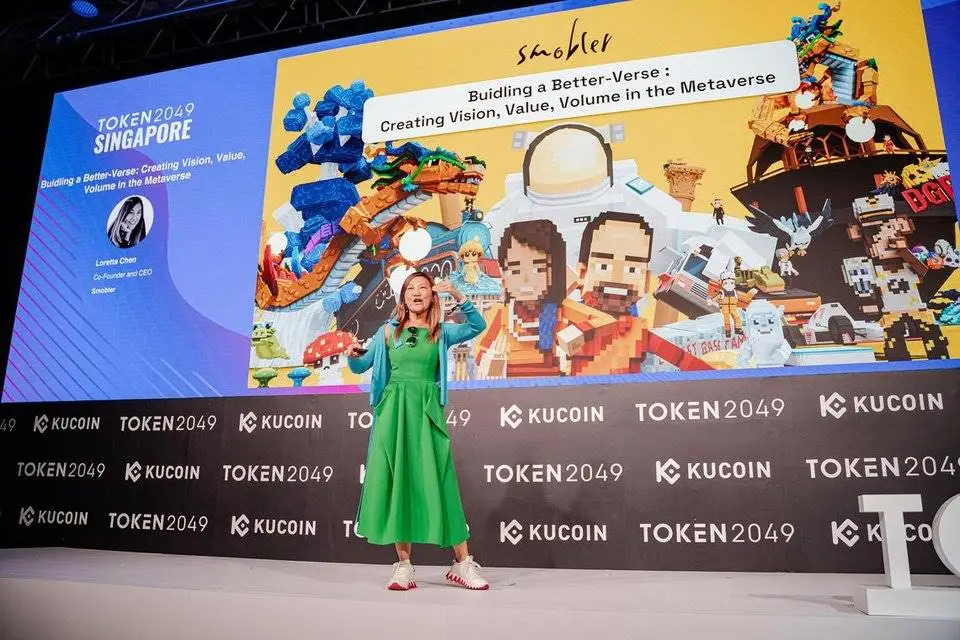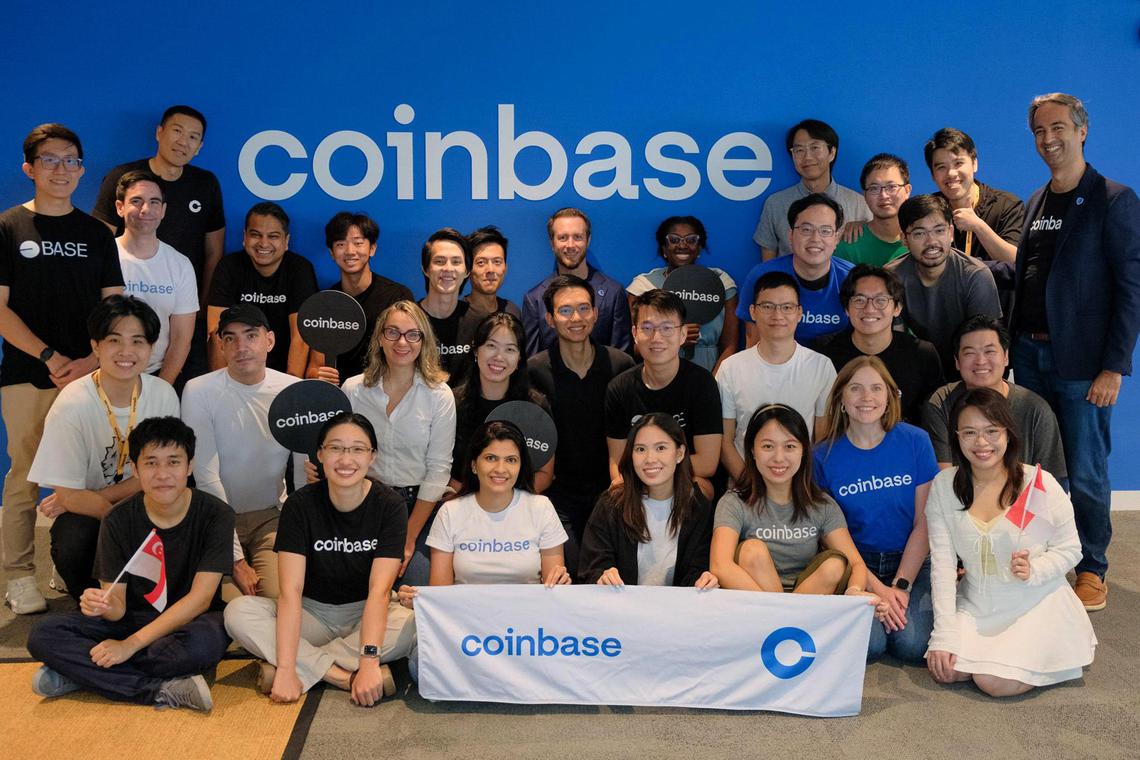By Teo Kai Xiang
Compiled by: TechFlow
In 2024, Singapore hosted the world's largest crypto conference - Token2049, which attracted a large number of participants.
Key Takeaways
The crypto industry experienced several crashes in 2022, including FTX and Three Arrows Capital, but the subculture surrounding cryptocurrencies is recovering.
The cryptocurrency subculture blends idealism and opportunism, attracting a young, tech-savvy crowd, but it is also rife with fraud and scams.
With increased regulation and institutional interest, cryptocurrencies are gradually gaining legitimacy and attracting talent from traditional finance and technology. However, some industry insiders worry that this may cause the crypto industry to lose its original spirit.
SINGAPORE — If you ask anyone working in or investing in the crypto space about the outlook for the industry in 2022, they’ll likely purse their lips and remain silent for a moment.
This year, the crypto industry experienced a series of headline-grabbing collapses. FTX, one of the world's largest cryptocurrency exchanges, filed for bankruptcy. Singapore-based crypto hedge fund Three Arrows Capital collapsed, owing creditors over US$3 billion (approximately SGD 3.85 billion). Cryptocurrencies TerraUSD and Luna plummeted in value, wiping out a cumulative US$45 billion in market capitalization.
Cryptocurrency prices have plummeted, and a wave of layoffs has swept across the industry, with many observers predicting the advent of a crypto winter.
Three years have passed and the industry atmosphere has changed.
Driven by US President Trump's crypto-friendly policies and the gradual adoption of cryptocurrencies by major financial institutions such as Goldman Sachs, BlackRock and Singapore's DBS Bank, the value of Bitcoin soared to a record high, breaking through the $100,000 mark and peaking at $140,000 in January this year.
Token2049, the world’s largest crypto conference, is expected to welcome 25,000 participants to Singapore in October.
When Token2049 was first held in Singapore in 2022, it attracted only about 7,000 attendees, and the event venue only occupied one floor of the Marina Bay Sands Expo and Convention Center.
By 2025, the conference will expand to five floors, highlighting the rapid development and increasing influence of the crypto industry.
The crypto community is back with a vengeance. Among the 15 people interviewed by ST, the overall mood was optimistic, even celebratory.
“After Trump was elected, the crypto industry took off,” said Kaushik Swaminathan, 29, head of strategy at the Web3 security firm Zellic. Web3 is the industry’s term for the new generation of the internet powered by blockchain technology.
“When prices go up, people feel rich. And when people feel rich, they do lavish things,” said the Yale-NUS Arts and Sciences graduate. “While the broader tech market may be experiencing a contraction or a hiring slowdown, the crypto industry seems to be doing the opposite.”
He cited the recent EthCC crypto conference in Cannes, which attracted 6,400 attendees. The southern French city, known for attracting the rich and famous, was "overrun" by crypto people in June, with events taking place on yachts, in castles, and at Michelin-starred restaurants.
“If you’re at a ‘work conference’ on the French Riviera in the summer, that’s probably a good sign,” he lamented. “Confidence in the crypto community never really faded, and when Bitcoin was trading over $100,000, people were more willing to participate in these kinds of lavish events.”

In 2024, Token2049's conference in Singapore attracted more than 20,000 participants.
Image source: TOKEN2049
Crypto bro culture—born from internet memes mocking central banks and countercultural idealism about decentralized finance—is seeping into mainstream society.
Despite being mired in scandal, it is now winning support from recent graduates who once aspired to join traditional finance or big tech.
Anti-establishment wave
The crypto industry's blend of idealism and opportunism has fostered a unique "anti-establishment" culture that is distinct from traditional technology and financial industries.
Imran Mohamad, a 41-year-old cryptocurrency enthusiast in Singapore, recalls how an enthusiastic entrepreneur gave him a USB stick containing Bitcoin in 2010. At the time, Bitcoin was a little-known technology discussed only in fringe online forums and worth only a few cents.
“I don’t know where that USB drive went,” said Imran, now the head of Asia Pacific marketing for blockchain company Move Industries. “If I had had foresight, maybe I wouldn’t be doing this interview with you today.”

Imran Mohamad’s crypto career has seen the industry through multiple boom and bust cycles.
Image source: Imran Mohamad
Imran Mohamad’s subsequent on-again, off-again relationship with the crypto industry aptly reflects the sector’s multiple boom-and-bust cycles. During the 2017 initial coin offering (ICO) boom, he ran a marketing firm serving crypto clients.
“For most of these companies, nothing really happens,” said the National University of Singapore (NUS) Business School graduate. “The ones who really profit are the ones who mint the tokens — and then they disappear without a trace.”
These online sales, open to the public, are fueled by social media hype and centered around a white paper that spells out how the proceeds will be used to develop a “hot new token” and how much investors can gain by buying in early.
Having to threaten some cryptocurrency clients with legal action for non-payment, he grew sour on the industry. He later returned to the crypto industry in 2022 as Head of Markets at crypto trading platform Kyber Network—until the platform was hacked, losing over $50 million worth of assets. While Kyber ultimately repaid creditors, he noted that these investors still missed out on potential gains.
Such experiences are not uncommon in the crypto industry, where people often harbor a complex fear of missing out (Fomo), are deeply optimistic, and even accept malicious behavior as the norm.
Unlike traditional industries, practitioners in the crypto industry usually do not introduce themselves through LinkedIn or hand out business cards. Instead, they prefer to communicate through Telegram and X (formerly known as Twitter), or establish connections at activities that blur the boundaries between work and entertainment.

Aneirin Flynn (pictured left, at the startup competition Meet The Drapers) chose to skip university and go straight into the workforce.
Image source: Failsafe
Young Singaporeans like Aneirin Flynn, 31, embody the subculture's free-spirited style. As CEO and founder of an encrypted cybersecurity startup, he hired an engineer who had previously hacked into his company after discovering vulnerabilities in its code.
Many people in the crypto industry operate anonymously, avoiding using real names or photos for fear of being doxed or hacked.
"He wouldn't reveal his real name or where he was from," Flynn recalled, adding that he later discovered the hacker was from Egypt. After months of collaboration and trust-building, the hacker ultimately proved to be a "good guy."
He added: "Today, he's become a pillar of our company. He's a big, strong man with a big, thick beard, has kids, and is the friendliest guy I've ever met."
However, he also admitted: "But there is a possibility that he will be a bad person."
Even Flynn’s company, FailSafe, was inspired by a 2022 hack that cost him around $20,000 because he trusted the wrong developer – something he suspects he lost. After completing his A-levels at Victoria Junior College, he dropped out of university to join a startup.
He noted that while Web3 advocates for an idealistic and “trustless” internet future without a central authority, the reality is that “it means you’re on your own.”
Face-to-face interaction has become increasingly important for people like Flynn who work in cryptocurrency because of the prevalence of fraud.
So, while others might prefer to network by attending events organized around the annual Token2049 conference, he prefers to connect by hosting events where he can “sweat together and understand how we operate under intense circumstances.”

Token2049's diverse culture showcases a relaxed and casual atmosphere full of meme elements.
Image source: Token2049
Token2049 epitomized the crypto industry’s diverse culture, with the Singapore event attracting speakers from diverse fields, including Canadian Ethereum co-founder Vitalik Buterin, British Formula 1 driver Lando Norris, American whistleblower Edward Snowden, and Australian rapper Iggy Azalea.
Industry insiders revealed that the real action wasn’t happening on the conference stage, but rather at peripheral events like invitation-only social gatherings and parties. At the exhibition floor, attendees could try out icy plunge pools or ride a mechanical bull, just meters from the discussion panels.
Resistance Currency

Meme culture dominated the annual Token2049 conference. “Hodl” (hold your coins until you buy) became a slogan to encourage cryptocurrency investors to hold on to their assets during turbulent times.
Image source: TOKEN2049
The origins of the crypto industry’s anti-mainstream energy lie at the intersection of fringe internet communities, technology, and finance.
“Cryptocurrencies are essentially a rejection of financial institutions and central banks,” said Dr. Andrew Bailey, professor of philosophy at the National University of Singapore and author of Resistance Money (2024). “People who are attracted to this idea are often also skeptical of other types of institutions and norms.”
The concept of modern cryptocurrency was born in the aftermath of the 2008 financial crisis, when libertarians, anarchists, and some criminal elements sought decentralized alternatives to a financial system they believed no longer served their needs.
Different generations enter the crypto space in different ways. Early adopters, often computer programmers, may have encountered the space through fringe internet communities or online black markets. Later adopters, such as Generation Z and young millennials, are more likely to be introduced to crypto through viral memes or influencers promoting new paths to success.
Dr. Bailey said disillusionment was a common unifying force.
Many who embrace this subculture believe they have discovered a field where they can surpass others and achieve substantial short-term gains.
“I don’t want to discount too much the desire people have to succeed in a world they believe is unfair,” he said. “The 18- to 24-year-olds I talk to, they feel that very strongly. I would say they feel it more strongly now than their peers did five to 10 years ago.”
The result is a subculture dominated by young, male, tech-savvy people who are dissatisfied with or disenfranchised from financial institutions.

Similar to the tech industry, the crypto space remains male-dominated.
Image source: TOKEN2049
Mr Jeremy Tan, 34, embodies this shift in public attitudes towards cryptocurrencies. The Nanyang Technological University business graduate is running as an independent candidate in the Mountbatten constituency in the 2025 general election and has advocated for the government to adopt Bitcoin as a reserve currency.
Mr. Tan said his interest in Bitcoin was sparked by the counterculture that emerged after the 2008 financial crisis, with movements like "Eat the Rich" and "Occupy Wall Street." This interest stems from his own upbringing in poverty and his desire to find an asset that wouldn't depreciate over time.
“Now, we’re seeing the same type of movement,” he said, noting that similar economic discontent is driving Singaporeans’ interest in cryptocurrencies. “The ‘Occupy Wall Street’ of our generation will be about artificial intelligence and youth unemployment.”
This sentiment is echoed by other crypto enthusiasts and advocates, some of whom complain about being unable to join the "high net worth club," consider the existing financial system "unfair," and praise cryptocurrencies for their potential to level the playing field by creating a new scene without established experts.
However, Web3’s decentralized philosophy does not mean that crypto subcultures can self-regulate or have a consistent ideology.
While crypto was initially envisioned as a “superior” alternative to centralized finance, most respondents viewed the growing interest from regulators and banks as a positive sign.
Mr. Tan also weighed in on the ideological contradictions: “The original ideology was that the currency was being devalued and we needed to fight the government with a ‘resistance currency.’”
“I think the original ideology is meeting its newer form because stablecoins and Bitcoin are enabling a revolution that ultimately relies on technology and math, not bad fiscal planning.”
Not unlike The Wolf of Wall Street

2024 Singapore Token2049 celebration party.
Image source: TOKEN2049
This anti-establishment atmosphere is what many in the crypto industry are eager to escape.
Almost all industry insiders interviewed by ST tried to downplay the industry's association with luxury lifestyles and world travel, instead emphasizing the industry's "growth" since 2017.
Joash Lee, a 22-year-old Columbia University student, invests in Web3 and AI startups through Iron Key Capital, a funding pool focused on investing in startups.
He said that while it’s not uncommon for crypto companies or conferences to rent yachts and nightclubs for events, the phenomenon is relatively restrained compared to the “free money” era before 2022, when venture capitalists would rush to fund seed rounds simply by writing “Web3” on a business plan.
Others say the crypto industry's "immaturity" is prone to this lifestyle, such as squandering money hiring models and influencers to join teams and designing outfits and throwing parties based on obscure internet memes.

Dr. Loretta Chen (pictured at the Token2049 event) believes that the excesses of cryptocurrencies are a sign of the industry’s immaturity.
Image source: SMOBLER
“When the concept of cryptocurrency was proposed, the younger generation and digitally savvy people embraced it,” said Dr. Loretta Chen, 48, founder and CEO of local Web3 startup Smobler.
"When you're young and suddenly you have all this money, you're like, 'Wow, let's have a party,' right?"
The current situation is often compared to the excesses of Wall Street in the 1980s — as depicted in the 2013 film “The Wolf of Wall Street” — before regulation began to impose discipline.

Ms. Soh Wan Wei (right) poses with Hide the Pain Harold, a popular internet meme, at an ARC community gathering in 2024. ARC members purchased Memeland tokens in the early stages.
Image source: Provided by SOH WAN WEI
Another notable example of the industry embracing party culture is private members club ARC Community, known for the lavish annual parties thrown by its Singaporean co-founders, who include singer JJ Lin and influencer Elroy Cheo.
Members of the social club are required to own its non-fungible token (NFT), a digital asset currently being sold on the online marketplace OpenSea with prices starting at $4,000.
Members could pre-purchase Memecoin, a cryptocurrency created by the internet culture website 9GAG, whose founders were also ARC members. In 2024, they gathered for a meme-filled celebration featuring guests like Memecoin ambassador Hide the Pain Harold. Since then, Memecoin's value has plummeted.
ARC Community brand director Jaclyn Lee declined to discuss the club's parties or its members' lifestyles and social networking habits.
“We try to avoid those angles because they further reinforce the perception that Web3 is less legitimate,” she said.
This sensitivity to outside perception explains why the crypto industry has increasingly shied away from talk of lavish parties and the high life of its founders, preferring instead to reshape its image by featuring magazine stories about founders and how they fell in love with the technology.
Chasing the dream of "Waterfall"

Members of the crypto space are working to downplay their association with lavish parties and globetrotting.
Image source: TOKEN2049
Dr. Li Xiaofan, an assistant professor at the National University of Singapore (NUS) who studies cryptocurrencies and cybersecurity, pointed out that the technology behind cryptocurrencies is still in its early stages, which means that although some application scenarios have been established, excessive speculation is still the norm.
Dr. Li recalled past examples of students who were inspired to pursue internships or careers in the crypto industry, only to be disappointed.
“They thought they would be designing systems or making technical improvements in some area, but it turns out it’s more like a sales job,” he said. “Getting customers and funding is much more important than developing technology.”
The lack of cryptocurrency regulation in many parts of the world means the allure of short-term gains – often by exploiting investor information gaps – can be hard to resist.
The 2017 ICO (Initial Coin Offering) bubble was the result of a surge in public investment in the crypto industry, driven by a fear of missing out on early investments like those in Apple or Google. However, unlike IPOs (Initial Public Offerings), the risks of crypto asset investments are not mitigated by financial reporting and auditing, leaving investors operating in a fog of war.
These include scams and other activities, such as insiders profiting at the expense of other investors, exaggerating the actual degree to which products are related to blockchain technology, and building ecosystems to promote more crypto activity.
“There are certain traits that attract people to this industry,” Dr. Li observed. “In my opinion, this may delay the industry from developing for its long-term benefit.”

Experts say hype and speculation have driven the crypto industry's focus on quick profits rather than long-term value creation.
Image source: TOKEN2049
“The way to make money in crypto is to think of it as a waterfall of manure,” Dr. Bailey said, summarizing the commonly held worldview in crypto circles. “Either the manure falls on you, or you stand higher up, safe and sound, and you take the manure on someone else.”
This normalization of malicious behavior is echoed by many within the industry.
For example, one marketing professional described the “extremely high failure rate” as being similar to that of tech startups. Another, when asked about their feelings following the high-profile stock market crash in 2022, said, “It’s normal to go through something like that,” but that the joy of being in an emerging industry made up for it.
The idea of a “zero-sum game,” where profits mean others must bear losses, is common jargon within the industry.
“It’s PvP (player versus player), not PvE (player versus environment),” Dr. Bailey added, borrowing a term from video games to describe the competitive, rather than cooperative, behavior among crypto users. “If you’re taking something away from it, it means someone is putting that money into it.”

Kaushik Swaminathan, a graduate of Yale-NUS College in Singapore, said his mindset has become more transactional since he started working in the crypto industry in 2021.
Image courtesy of Kaushik Swaminathan
As Mr. Swaminathan observes: “When cryptocurrencies lose money, people get depressed; when they make money, people get excited. No one really cares about scandals, except that the aftermath of scandals is losses. You need thick skin to survive in the crypto space, and those who do are mostly insensitive to the outside noise.”
What makes him uneasy is that since entering the crypto industry in 2021, his way of thinking has gradually become more "transactional."
“That’s not what I like,” he said. “Once you get into the cryptocurrency black hole, money becomes the currency or the language of all interactions.”
This also means that when someone presents an idea to him in a meeting, his default mindset is to doubt whether he will be taken advantage of. He explains: "People often say, 'I don't want to be your exit liquidity,' which means, 'I don't want to be the one who gets taken advantage of by your asset sales.'"
"Cult"
Ms Soh Wan Wei, 37, who has been investing and working in the cryptocurrency space since 2017, took a harsher view, saying she disliked the "I do whatever I want" culture that prevailed in the sector.

Ms Soh Wan Wei (pictured, speaking at a fintech event) said money is distorting the ethics of those working in the crypto industry.
Image source: SIBOS
“People from Binance went to jail, and when they came out they were treated like gods,” she said, referring to Changpeng Zhao, the former CEO of the cryptocurrency exchange Binance, who was sentenced to four months in prison in 2024 for money laundering.
She added: "If someone's net worth suddenly increases 1,000-fold, they're worshipped as a god. It's very cult-like."
She noted that in the crypto industry, wealth seems to equate to morality. She recalled seeing some crypto people showing off photos of themselves in castles and helicopters. To build relationships, she would "applaud and say, 'That's great, I'm happy for you.'"
Still, she acknowledges that the volatility of the crypto industry has a somewhat addictive quality. Despite the risks of “rug pulls” (founders absconding with investors’ funds) and the risk of asset values plummeting, the adrenaline rush of a successful bet remains captivating.
“It feels like buying a Labubus (Shenchao Note: a popular trendy toy series launched by Pop Mart, which is a blind box product).”
These days, she prefers to stay away from cryptocurrency conferences. “The barrier to entry is too low,” she added. “You can get rich just by buying Bitcoin.”
This volatility further intensifies the ideological fervor of crypto subcultures while weeding out those who lack the fortitude or conviction to persevere after high-profile crashes.
A few weeks after joining Web3 software company Animoca Brands in 2022, Mr. Brian Chan witnessed the uproar caused by the cryptocurrency Luna and the subsequent downward spiral of FTX, which marked the beginning of a bear market era for the industry.
“Crypto volatility is a feature of the industry, not a bug,” said Mr Chan, who splits his time between Hong Kong and Singapore as deputy CEO of Animoca Brands, where he oversaw the development of Anichess, a blockchain chess game, in partnership with chess.com.
Mr Chan observed that this volatility is being eliminated not only within Animoca Brands but also across the industry.
The industry's uncertainty is also affecting how hiring managers screen candidates.
“When hiring, we do focus on culture and values,” Mr. Chan said. “When I hire for my team, I pay less attention to their resume or CV and more to what they’ve actually done in crypto. That tells you whether they’re going to stick with it for the long haul, and whether they’re a true believer or just chasing profit.”
This emphasis on non-traditional metrics is part of the crypto industry's appeal to young, hungry talent, especially when compared to traditional finance, which prioritizes academic credentials from prestigious universities.
However, Mr. Chan noted that the current wave of interest in the crypto industry is different. While past growth cycles were driven by “hype and dump manias,” the 2025 era sees a growing number of professionals in suits bringing new legitimacy to the space.
Is Singapore becoming a cryptocurrency capital?

OKX's Singapore office is located in the Marina Bay Financial Centre. The company has over 900 employees in Singapore.
Image: OKX Singapore
Despite a resurgence of crypto bro culture globally, industry insiders are divided on whether Singapore can become a hub for the crypto industry. Local regulations paint a complex picture.
In June, the Monetary Authority of Singapore (MAS) tightened regulations, requiring cryptocurrency service providers serving customers outside Singapore to obtain a license. Previously, only cryptocurrency service providers serving customers in Singapore were required to obtain a license.
Other restrictions include a ban on crypto companies advertising their services in Singapore and a requirement for providers to conduct customer due diligence and report suspicious transactions.
Experts told ST that several issues hinder effective regulation of the crypto industry. These include a lack of auditing tools to ensure the proper and secure operation of smart contracts (computer programs running on blockchains), the prevalence of cybercrime, the ease of anonymity and market manipulation, and, in many cases, the lack of accountable regulatory bodies.
“While the potential of blockchain and cryptocurrencies is enormous, regulators need to confront these complex challenges,” said Dr Daniel Rabetti, Assistant Professor at the National University of Singapore Business School.
He added that asset tokenization, which involves representing real-world assets as digital tokens, remains a promising application for the technology, potentially opening up traditionally illiquid markets and fostering greater financial inclusion.
Industry insiders say that the trend of the crypto industry's transformation towards institutionalization in recent years has led to the departure of some people, including those who tend to operate in the gray area of the crypto industry and those who refuse to comply with compliance and monitoring requirements.
On August 1, the Singapore police and the Monetary Authority of Singapore (MAS) announced that local cryptocurrency trading platform Tokenize Xchange was under investigation. A director of its parent company was also charged with suspected fraudulent trading. Previously, the company stated that it had ceased operations in Singapore and planned to relocate to Malaysia.
In June, Bloomberg reported that unlicensed crypto exchanges such as Bitget and Bybit were planning to move their existing operations in Singapore to Dubai and Hong Kong.
At the same time, due to the highly remote nature of the crypto industry, many employees working for unlicensed exchanges such as Binance continue to choose to live and work in Singapore, even though these exchanges are unable to provide services to Singaporean customers.
It is not just regulation that has affected the development of the crypto industry. Some believe that the crypto industry's emphasis on decentralization and breaking with tradition seems incompatible with Singapore's focus on centralization and stability.
Some privately say that crypto professionals are more inclined to embrace unconventional lifestyles that may be difficult to achieve in conservative Singapore. For example, the FTX debacle drew significant attention to its leadership’s cohabitation and polyamorous relationships.
In fact, the size and density of Singapore's crypto industry means that almost everyone knows each other, and the atmosphere is more like a "village" or "middle school" than a growing hub - especially during the non-conference season. This also means that gossip spreads quickly and people can easily form "closed-loop" relationships.

Dr. Loretta Chen (right) believes that Singapore’s crypto regulatory policies allow local companies to promote compliance as a competitive advantage.
Image source: SMOBLER
Despite the challenges, crypto enthusiasts like Dr. Chen are optimistic about Singapore’s future. She believes that Singapore’s reputation for safety and a strong regulatory framework makes it a natural hub for “intelligent talent” and high-net-worth individuals.
She specifically mentioned that whenever Ethereum founder Vitalik Buterin visits Singapore, he does not need a security team and can use public transportation - something that is difficult to achieve in other crypto hubs.
This content cannot be displayed outside of the Feishu document at this time
Dr. Chen said that starting a company in Singapore has also led to a different type of company setup. She noted that Smobler has shied away from the lure of short-term profits in “sh**coins and memecoins” and has diversified into artificial intelligence and virtual reality.
“Technology does support these areas and many people are rushing in, but we won’t,” she added, noting that close collaboration with financial institutions and regulators requires a long-term orientation.
“Regulation is like training wheels and guardrails,” Mr. Swaminathan said. “We can’t be free-wheeling cowboys forever.”
Wear a suit
As regulators and financial institutions around the world gradually engage with practitioners in the crypto industry, the field is gradually gaining greater legitimacy. This trend has attracted more professionals who might have originally entered traditional finance or consulting industries.
Crypto enthusiasts like Mr. Tan point out that as banks and family offices increasingly discuss cryptocurrencies and host events, the change is pushing the industry away from the original crypto bro Twitter culture.

Mr Hassan Ahmed (top right, pictured with the Coinbase Singapore team) said the company is experiencing a surge in interest from job seekers.
Image source: Coinbase
Hassan Ahmed, head of Coinbase Singapore, said that regulatory uncertainty before 2025 will not only affect businesses and capital allocators, but also discourage job seekers. He said: "Perhaps I will not choose to plan my career path in an industry where I may be deported overseas."
Coinbase currently has about 100 employees in Singapore, and Ahmed noted that the company is experiencing record numbers of job applications.
Similarly, Gracie Lin, 43, CEO of cryptocurrency exchange OKX Singapore, said her 900-person company has seen a sharp rise in job seeker interest, with job applications triple in the first half of 2025 compared to the same period in 2024.
This interest comes not only from "Web3 natives", but also from senior practitioners in traditional technology and finance, as well as recent graduates.
Lin believes: “The industry as a whole seems to have entered a more confident ‘post-winter’ phase, with regulatory clarity in Singapore and other key markets undoubtedly driving this momentum.
This change is also reflected in activities such as Token2049.

Token2049 business director Chua Ee Chien said the conference is attracting increasing attention from institutions outside the crypto space.
Image source: TOKEN2049
Chua Ee Chien, 37, business director of Token2049, said that four years ago, the event featured speakers exclusively from the crypto space, while now the conference has attracted speakers from BlackRock and Goldman Sachs.
Attendees said this sometimes created a confusing mix of cultures, with suited bankers and regulators holding roundtable discussions on one side and men in T-shirts and shorts rubbing shoulders with scantily clad women in costumes or diving into cold pools on the other.
“I sit here and think, this is exactly why crypto hasn’t seen wider institutional adoption yet,” Mr. Flynn said. “But that contradiction is fascinating, and that’s what draws people like me into this space.
Mr. Eddie Hui, 50, is one such person who made the difficult transition from traditional finance to cryptocurrency. After working at Societe Generale for 23 years, he moved from France to Singapore in 2022 to join MetaComp.
MetaComp is a digital payment solutions provider whose products include cross-border payment infrastructure powered by stablecoins (typically cryptocurrencies pegged to existing currencies such as the US dollar).
“Until recently, if you mentioned digital assets, people probably had no idea what you were talking about,” he said. “If you mentioned cryptocurrency, they would say it’s a scam. But with the Genius Act, it really brings a lot of legitimacy to the space.”
The Genius Act is a U.S. federal law that aims to establish a comprehensive regulatory framework for stablecoins and was signed into law by President Trump in July.
Dr. Emiliano Pagnotta, Associate Professor of Finance at Singapore Management University, noted that stablecoins have become a major application of cryptocurrencies. In 2024, on-chain stablecoin settlement volume exceeded $15 trillion, surpassing the transaction volume of Visa and Mastercard.
“Despite this growth, regulatory ambiguity remains a barrier to wider adoption. This has changed with the recent passage of the Genius Act in the US,” he said.
Dr. Pagnotta added that Bitcoin has also become a household name, with a market capitalization surpassed only by gold and the top six US companies (Nvidia, Microsoft, Apple, Amazon, Alphabet/Google, and Meta). Since the launch of the US spot Bitcoin exchange-traded product in 2024, integration with traditional finance has accelerated, attracting over $54 billion in inflows.
"In 2025, a trend worth noting has already emerged: companies are acquiring Bitcoin as a treasury reserve asset," he said. "Overall, this momentum is unlikely to fade given ongoing global concerns about fiat currency devaluation, geopolitical instability, and the erosion of property rights."
Meanwhile, Dr Christian Hofmann, associate professor at the National University of Singapore’s Faculty of Law, said even central banks are now exploring the use of similar technologies.
“Of particular interest is the concept of wholesale central bank digital currency (CBDC) – a tokenized form of central bank money,” said Dr. Hofmann. “Particularly in the context of cross-border transactions, such CBDCs could facilitate payments across jurisdictions and reduce reliance on existing private sector intermediaries, particularly correspondent banking networks.”

Mr. Eddie Hui moved from the banking industry to the crypto industry, becoming a typical representative of the increasing institutionalization of the field.
Image source: MetaComp
For Mr. Eddie Hui, a long-time banking professional, the transition to cryptocurrencies was not without its challenges. One of the challenges was the constant need for education and product explanation when dealing with traditional financial institutions.
“I never thought I’d be in a field where people would be questioned,” he said. “You have to do a lot of education so people understand what you’re trying to do.”
He added: “This is very different from banking, where anyone who wants to break into the industry has studied finance at some point. But in crypto or digital finance, you can’t say, ‘Please find me a candidate with more than 10 years of experience.’ There are some such professionals, but it’s more difficult to find them.”
However, Mr. Hui also acknowledged that many of the company's senior employees come from traditional finance backgrounds. "All the experience and knowledge we've accumulated in traditional finance, we're trying to apply it to the digital asset space."
Some industry insiders told ST that this institutionalization marks the crypto industry's gradual departure from its wilder and more informal subculture origins, which were once based on distrust of centralized finance.
“Traditional prestige indicators, like what you’d typically look for in investing, banking, or traditional tech roles, are now finding their way into the crypto space,” Mr. Swaminathan said.
"People care about your Ivy League education, your big-company resume," he said. "These are things that five to eight years ago people absolutely wouldn't have cared about. Now, frankly, it's almost the same as if you were applying for a job at Google."







